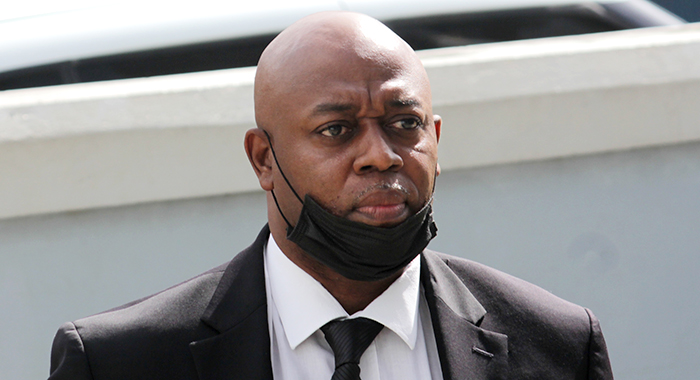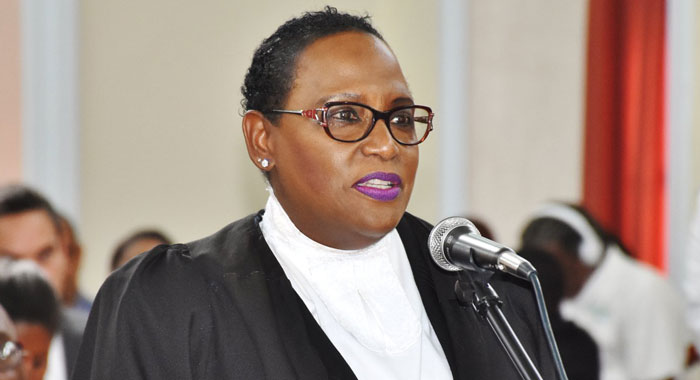Two of the three women, who, as teenagers, were charged with murder over the Sept. 4, 2017 death of Simonia Da Silva, 23, of Fair Hall, are slated to be sentenced today (Wednesday) at High Court No. 1, in Kingstown.
Twanecia Ollivierre, of Chapmans, Alana Hudson, of Campden Park, and Taylor Mofford, of Belmont, accepted the prosecution’s offer and pleaded guilty to manslaughter.
Ollivierre was 19 at the time, Hudson was 19 and Taylor was 18 at the time of the killing.
They were scheduled to be sentenced on April 1, but Ollivierre’s lawyer, Michael Wyllie quit the case after she disagreed with his advice and maintained a guilty plea for manslaughter, rather arguing self-defence in a murder trail.
Justice Brian Cottle then appointed Patina Knights to represent Ollivierre, and set her mitigation hearing for today, when he will sentence Mofford, who is represented by Duane Daniel, and Hudson, who Kay Bacchus-Baptiste represents.
Tammika Mc Kenzie-Da Silva appeared for the Crown.

Mitigating on Mofford’s behalf, Daniel told the court on April 1 that agreed with the Crown that based on the sentencing guideline that the crime should be regarded as level C.
He said the defence had “no material difficulty” with the 12 years starting point that the Crown proposed.
The lawyer said his client did not wield the weapon that caused Da Silva’s death.
He said that Mofford had three of the strongest mitigating factors: a guilty plea; youth — having turned 18 just a few weeks after her crime; and, no previous conviction.
“Those are three of the most powerful mitigating factors that any prisoner can have,” Daniel said.
He said that she should be entitled to the full one-third discount on her sentence for her guilty plea.
The lawyer argued that his client was charged with murder, and that that charge hung over her head for some time before she pleaded guilty to manslaughter.
“… but, as the court can see, the prosecution was willing to concede that given the circumstance, manslaughter was applicable as they entered a guilty plea to manslaughter.”
Daniel asked the court to take this into account as the negotiations in that regard only culminated in October-November that year and that disclosure was still taking place up to Sept. 15.
He said that for as long as he had been representing Mofford, the first opportunity to plead to manslaughter was when the charge was read to her again in February 2022 and she readily pleaded guilty.
Daniel said that in light of these facts, he differed with the Crown’s position that Mofford did not plead guilty at first practicable opportunity.
He said that should the crown accept his submission, that would take the sentence down to eight years.
The lawyer said he was aware of what could happen in circumstances where “exuberance of youth, where the mind and a proper appreciation of action are not properly coalesce” in a way that maturity can bring.
“I ask the court to take into account that she was but 18 years at the time of the offence.”
Daniel said that his client had good prospects of rehabilitation, as prior to the crime she was “unknown to the police and not an offender.
“She is a virgin to the court.”

He said that Mofford was at the time a year 1 student at the Technical College.
She, along with a sibling, lived with her unemployed mother and was doing her best to elevate her circumstances.
Mofford graduated from Emmanuel High School, Mesopotamia with six O’levels and was pursuing an associate degree in agriculture and business.
“She had dreams of elevating herself to a woman of self-employment not only to assist herself, but to elevate the socio-economic circumstance of her family.
He suggested that these mitigating factors should drive the sentence down a further three or four year.
“Naturally, the court would look at the aggravating circumstances,” Daniel said.
He said that while he had no major dispute with the facts as presented by the Crown, “a cursory examination of the deposition gives varying versions of how the offence took place but none that suggested that anything prior to the infliction of the blows that there was reposed in the mind that there was a knife immediately prior, that Mr. Wyllie rose to pains to indicate that a knife being passed by a family member,” Daniel said.
“There was evidence that it was after that exchange that the wounds were inflicted,” Daniel said.
He asked the court to consider that Mofford cooperated with the police, gave an electronic interview “and gave no trouble that I am aware of”.
He said that established case law suggests that the court should consider accused people’s cooperation with the police.
He said that taking into account the various discounts that the court can apply and that the killing took place in youthful exuberance, the defence could not resile from the fact that a life has been lost.
The lawyer asked the court to find that the mitigating circumstances outweigh the aggravating.
He said that for at least part of the exchange, Mofford might have attempted to part the fight.
“Nevertheless, she has accepted her culpability and that in itself is a show of remorse,” he said.
The lawyer suggested that a sentence of seven years or less should be entertained and then adjusted for time spent on remand.
“She is but still a young woman and the experience of time in incarceration would no doubt be part of the cooling down for her further development and prior to this incident, she had not presented as a person who is a threat to society,” Daniel said.

And, Bacchus-Baptiste, mitigating on behalf of Hudson, said she had no serious objections to the facts as presented by the prosecution.
“… though there is always a tendency to present facts from a prosecution perspective,” she said.
She cited a witness who presented a view of the incident which she said showed Hudson favourably.
“The mother of the deceased had a cutlass attacking the crowd, her sister told her what to do with the knife,” Bacchus-Baptiste said, adding that in some regard she sympathised with Wyllie that this is important.
She, however, noted that she was not addressing Ollivierre’s case.
Bacchus-Baptiste lawyer also cited another witness who did not include Hudson in the fight.
“While I was there, I didn’t not see Alana saying anything to anyone,” she read, adding that the prosecution had said that Hudson’s role was one of attempting to part the fight.
“… and this is significant,” the lawyer said, adding that she wanted to point out those facts, apart from what the prosecution had said.
She said that the killing was a very unfortunate incident that could have been avoided.
The three young people were out enjoying themselves and that is what should have happened, Bacchus-Baptiste said, adding that the music, alcohol and the whole environment may have affected their judgement resulting in “this unfortunate incident”.
Bacchus-Baptiste said that the victim impact statement of the sister of the deceased laments that a number of other people were involved in causing the brawl but were not charged.
She said her client played the least role in starting the brawl, adding that the victims’ response is normal of a family having to deal with the loss of a family member.
The court, Bacchus-Baptiste said, deals with sentencing based on the guideline and not on the victims calling for the defendant to “spend the rest of their lives in jail”.
“I could understand those sentiments but the court has to be guided by the necessary thoughts that should be placed in sentencing.”
She noted that the victim impact statement of Chrystal Da Silva, the sister of the deceased, said 20 people were probably involved but only three were charged.
“This should not impact the sentence of the three charged,” Bacchus-Baptiste said, adding that the sentence should not be increased because 20 people were not charged.
She said that the mother of the deceased had said that she had problems being in her home and constantly checks doors and windows.
The lawyer asked the court to view this with scepticism, considering how long ago the incident occurred and how it occurred.
“It was not someone breaking into her home.”
Bacchus-Baptiste lawyer saw the case as a level D offence, adding that the introduction of a weapon came from the mother of the deceased.
“They did not walk behind with a weapon; none of the accused. So it was more or less of a brawl that went wrong because of the introduction of a weapon.
“So I am suggesting that the culpability of Alana, taking into account all that was said when she got into the actual fray, was to part the fight, that to begin at a level D would be reasonable.”

The lawyer suggested a starting point of six years, rather than 12.
“I am suggesting that apart from the fact that a life was taken, which, in any event, must happen in case of manslaughter, there are no aggravating factors,” Bacchus-Baptiste said.
She adopted Daniel’s mitigation on behalf of his client, saying they all apply to Hudson. “Youth, good character, students, genuine remorse,” Bacchus-Baptiste said.
“It is very, very likely that she could have gone to trial and be acquitted on self defence because of her involvement, the facts behind her, and what at least three prosecution witnesses could have said to the jury.
“The fact that she has shown genuine remorse should be considered. Like Mofford, she cooperated with the police, she gave no trouble to the police and she entered a plea of guilty at the first opportunity.”
However, justice Cottle noted that a murder accused can plead guilty to manslaughter at anytime.
“It was whether the prosecution would accept it.”
Bacchus-Baptiste said that her client offered a guilty plea, if not at the earliest, at a reasonably early period.
She said she was leaving to the court’s good judgement the starting point, adding that regardless, consideration be given to the mitigating factors.
“It is not an easy decision for a defendant to take, but this is a case in which the defendant could have won had it gone all the way even in a murder trial. The fact that she saved the court time should impact on the mitigating circumstances in relation to the defendant,” Bacchus-Baptiste said.
The judge adjourned the sentencing to today. The court is also expected to hear the mitigation on Ollivierre’s behalf and possibly complete her sentencing today.






